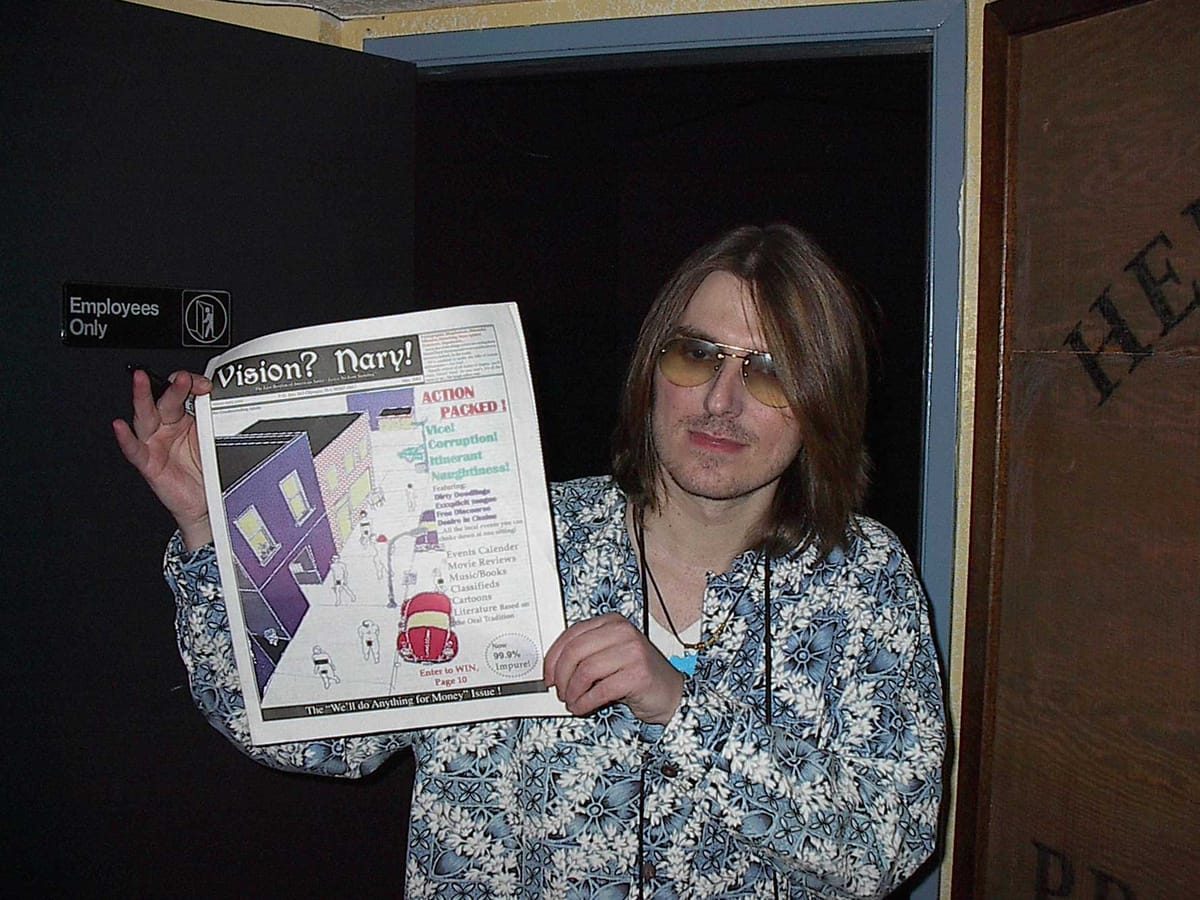Erogenous Gaps
Humor happens when an audience fills in the gaps--at its best, those gaps are packed layers deep with meaning. An explanation of an 18-word Mitch Hedberg joke.

The joke:
I got a parrot, and the parrot talked, but it did not say “I’m hungry,” so it died. —Mitch Hedberg, 1968-2005
Such a lean little beast. The joke, not the parrot. The best jokes, like the best prose, are stripped down to their essentials, their impact resulting from what is left unsaid. This one is a set of organs, and the animal around it must be imagined.
The unsaid element here is that the narrator neglected to feed the parrot. Did you feel the air lose its crackle just now? That happens when some jerk says the unsaid. Think how unfunny this joke would be with the appendage “…because I didn’t feed it.” It would be unfunny enough that the unfunniness would become a joke unto itself. A certain kind of comedian might ride that unfunniness.
Mitch Hedberg was not that kind of comedian.
Even if the last line were “…it didn’t know how to say ‘I’m hungry,’ so it starved to death”—less explanatory than “…so it died because I didn’t feed it”—it wouldn’t be as funny. We’re left to bridge the gap in explanation. This gap is the erogenous zone of comedy. A mind-blowing concept, since a gap is by definition an absence and an erogenous zone is tangible and has toes. Mitch Hedberg would see the beautiful discord of an empty space being an erogenous zone. He would see the humor in it. He would say, “What’s the deal with that?” but in a funnier way. And then we’d have a beer together.
Hedberg’s on-stage delivery was a curious mixture of charisma and terror, along with a certain level of intoxication. He made it feel as if his jokes were coming to him unbidden at the end of a long party. In certain performances of this particular joke, he adds a few little tics beforehand, as if he’s just remembered this great story you have to hear. He lulls us into believing it’s no big deal, then startles us 18 words later. It’s a trick few comedians can pull off. Bruce McCullough’s Kids in the Hall character Gavin would have the necessary awkward pacing, but not the casual tone.
So it’s a perfect joke, perfectly delivered. But to be fair, it would also be possible to tell with an elaborate setup: “A shy, friendless man realizes he has utterly failed at connecting with people, but can’t abide loneliness any longer. So he decides to buy a pet for companionship…” fast-forward through buying parrot, parrot talking, man delighted, man shows up at the vet a week later, “…but he never said ‘I’m hungry!’“ This would work.
If you really distrusted your audience, you could even add the ethnic angle: “Father O’Shaughnessy is stumbling home from a bender and finds himself in a pet shop…” and the punchline would reinforce how stupid and/or cruel the Irish are. But you and I see these setups for what they are: padding the word count for teacher. The one-liner comedian doesn’t rely on padding or giant fonts. Each offering must ring true and funny. Anyone who has ever felt the way Mitch Hedberg felt on stage should know that telling one-liners is like walking through a minefield and having to keep walking after every detonation. Bombs hurt, even the small ones.
What reasonably intelligent adult doesn’t know that a parrot must be fed, whether it can speak or not?
(By the way, what is the punchline here? “So it died”? As we see above, switch the last two fragments, and you get the same result. “I got a parrot, and the parrot talked, but it died, because it didn’t say ‘I’m hungry.’“ This would be closer to Steven Wright: “My talking parrot died. It didn’t say ‘I’m hungry.’“)
If the late Rodney Dangerfield were telling this joke, it would go something like “Mitch Hedberg is so stupid…” How stupid is he? “His talking parrot couldn’t say ‘I’m hungry,’ so it died.” Without playing the race card—a hackneyed phrase I’m trying to replace with “tweeting #race”—Rodney reaches the same conclusion about Mitch as we did about the Irish priest. What reasonably intelligent adult doesn’t know that a parrot must be fed, whether it can speak or not?
On the surface it seems Mitch Hedberg doesn’t know. But note that our theoretical Rodney says “couldn’t,” where Mitch says “didn’t.” “Couldn’t” implies the owner’s stupidity. With “didn’t,” you get a whole other dynamic. And no, it’s not that the parrot was too proud to ask for food.
It’s that Mitch Hedberg is really mean.
For there is another unsaid realization to glean from this joke—one more gap to cross. Mitch Hedberg is well aware that one must feed a parrot. But he’s not going to feed his. And then we take that final leap and realize Hedberg’s ultimate meaning: If you were so smart, parrot, you’d still be alive. Yeah, I see the empty feeder, I see a lot of feathers dropping, but I’m just gonna sit on my couch and eat artisanal spelt crackers, and when you say “Madam I’m Adam” or “Rubber baby buggy bumpers” or “Where’s the beef?” in ever-weaker squawks, I might shake my head and smirk, but until I hear what I want to hear, I’m not getting up.
We know all of this and we laugh, not only because it’s funny, but because we’ve filled in the surrounding story ourselves. This confluence of gaps has allowed us to create a backstory on our own—a borderline psychotic, PETA-inflaming backstory. In effect, we become the edgy comedian. We have been stroked just the right way, and not too much. I miss you, Mitch Hedberg, you sadistic fuck.
